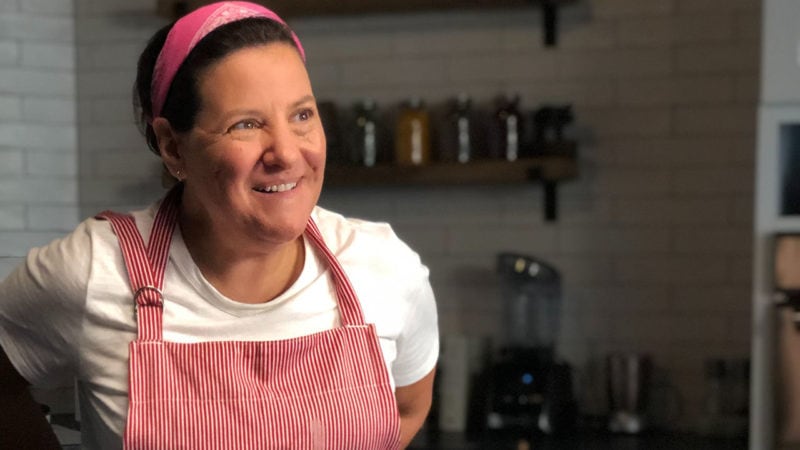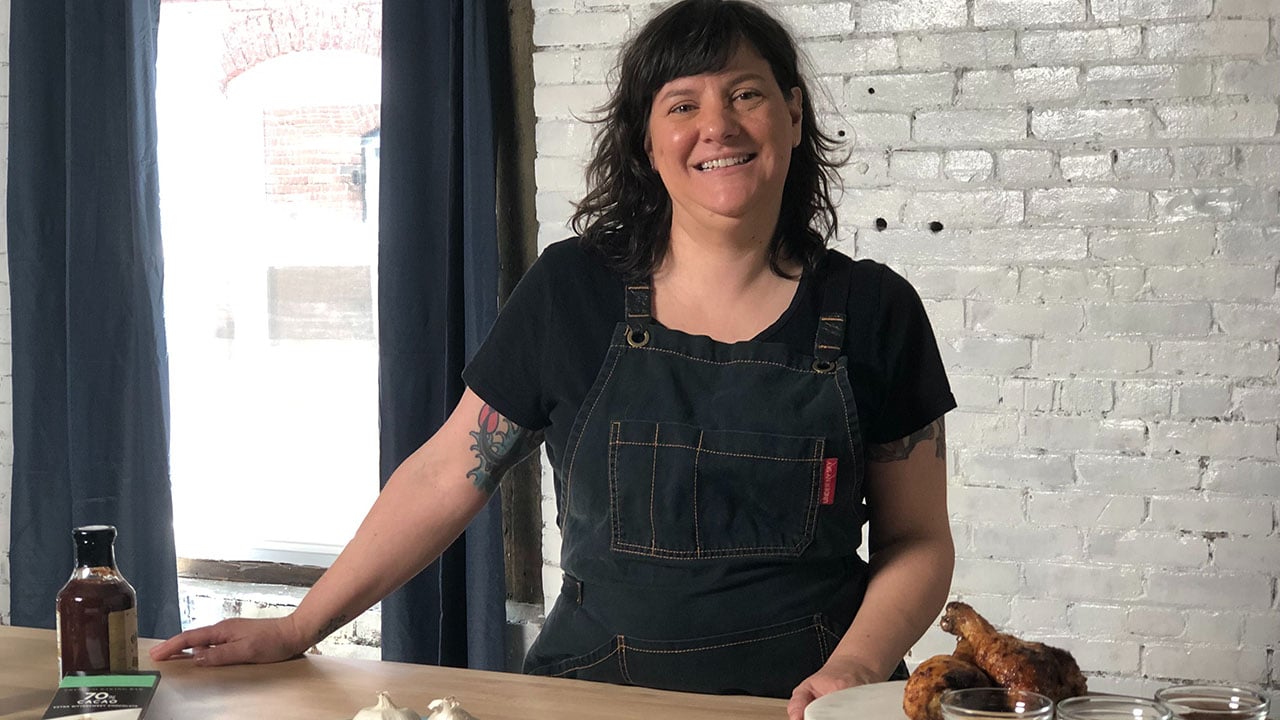Last Updated on April 26, 2021
I park in front of an old factory and double-check the address. I’m in the right place.
I venture inside, past various company offices and signs that tell me of the building’s history as a once-booming leather mill. On the top floor, at the end of the hall, I find an unassuming door with a tiny sign reading “ButcherBox.”
Inside, the test kitchen is a strange combination of impressive and cozy. Floor to ceiling black curtains, neatly tied back, separate the area into two sections. One is a workspace, with a handful of desks, a couch, and a view out over a marshland. The other is a make-space, which is many things all at once: Beautiful kitchen, a science lab, and a photography and video set.
And at the center of it all, is Emilie Abijanac.
She’s average height, with a smile that dominates her face, and a warm welcoming, laid-back vibe. She offers me chicken salad, fresh greens, and a fancy collagen drink, and then shows me around.
Who is ButcherBox’s Chef Emilie?
As the Culinary Director of ButcherBox, this space is her domain—the place where she designs recipes, experiments with different cooking and preparation techniques, and hosts food-centered photo and video shoots. Despite the daunting level of management and responsibility, Emilie has an easy, playfulness about her. She picks up a tiny set of pans, big enough to fit a single egg, maybe. “I love these little things,” she says, laughing. “They’re hilarious!”
I instantly feel at home in this space that would likely feel intimidating to many chefs. But for Emilie, operating a Test Kitchen is her dream job. Turns out, she’s been cooking and testing recipes her whole life.
“I really started cooking when I was seven or eight,” she tells me. “I have my first cookbook still, it’s a cookie cookbook. I still use it today. The peanut butter cookies in it are the best!”
Growing up, Emilie spent much of her time in France, where her mother is from. And when it came to food, making and creating wasn’t just encouraged—it was a requirement. “In our house, we made everything from scratch,” she explains. “It was a big deal! You can have crackers, my mom would tell us, and you can have bread, but we are going to make it.”
“My sister and I would beg, beg, my parents for Oreos or Chips Ahoy, and they’d be like, ‘Nope!’ I hated it at the time, but I’m so grateful for it now.”
She found her way into her first kitchen job—a prep cook at a Pizzeria Uno in Ohio—when she was 19-years-old. She learned very quickly that the food industry was not a soft-and-fuzzy environment. “I come from a field of working with all men. I’m always the only woman,” she says.
“Professional kitchens are very male-dominated. In some kitchens, there were men who liked to see if they can make the women cry. So, I never allowed that to happen. ‘You cannot make me cry,’ I’d say. ‘I will make you cry.” She gives a wry smile. “And I did.”
Sharing the Enjoyment of Cooking
Emilie attended the New England Culinary Institute, which led to an additional food and beverage management course—a four-year course that she completed in one year. “It was super intense,” she says. “But we got to be really hands-on in all the restaurants, so when I got out of there, I was already ahead of people, with real-life experience.”
That experience led her into a handful of different kitchens and restaurants, from Rigsby’s in Ohio, Migas Lodge in Maine, and Formaggio Kitchen outside Boston, where she eventually became executive chef. From there, she went into catering. Despite spending so much time in the cutthroat culinary world, she didn’t let the environment get to her. To her, it’s not about what other people think. It’s about the joy of creating and doing what you love.
“I don’t take anything seriously. I always got ‘you need to be more serious or you laugh too much.’” Again, she flashes her smile. “This is my personality. I think laughing is what keeps you young.”
Being young, though, doesn’t mean she still makes everything from scratch. “God no,” she laughs, and remarks on how today’s busyness and time constraints are different than when she was a child. “I always keep a bag of pre-shredded cabbage and carrots around,” she says. “There’s no shame in using precut vegetables!”
When discussing the move from catering to the test kitchen, she touches on the core of what drives her. “I always want to grow and be better and try and be an expert in my field, and the only way to do that is by constantly learning, being open, and having fun. Running a test kitchen was always my dream. Just making something, seeing if it’s right, being able to play with stuff, almost like a science project. Being able to have that freedom.” She gestures around at the space. “So when this came along, I realized, wow…this is it.”
Still Learning in the Kitchen
Despite all the responsibilities in her day-to-day, she’s still looking for more ways to learn and grow. “I’d love to make a ButcherBox cookbook,” she tells me. “And I would like to go to the farms and see what day to day life is like on the farms. Or even going on our fishing boat in Alaska.”
Emilie loops this idea back to her childhood. “In France, we had our own chickens, we got our own eggs from the chickens, we had a huge garden we got all our vegetables from. If we wanted chicken, we would take one from the coop down the street to a woman who would kill it for us. We were connected to the whole process.” She wants to share that connection, and understanding, with ButcherBox members—to let people not only enjoy cooking delicious meals in their own homes but to be connected to the larger community.
Our time runs out, and she leaves a few parting thoughts. “For women today [in kitchens], who cares? Say what’s on your mind. Say it. No one else is going to stand up for you.”
She laughs and points to the stove. “And don’t forget—there’s no shame in using precut vegetables!”




